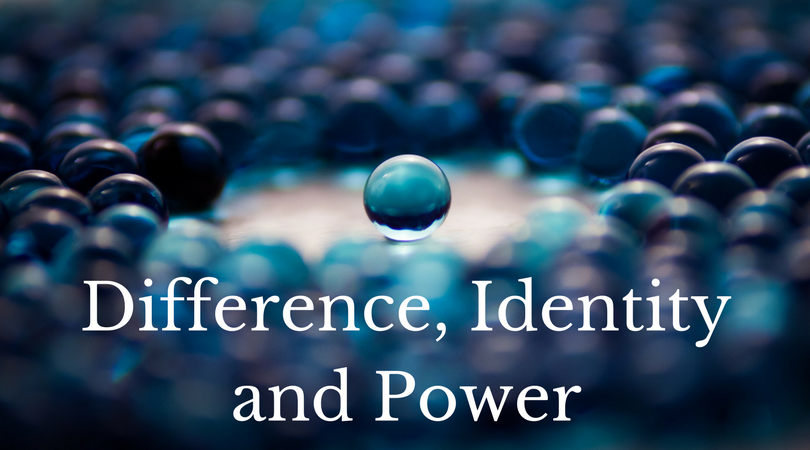 How have your ideas, beliefs, and assumptions been shaped by your identities and experiences?How are different identities shaped by power and privilege?How does identity and power play out in the workplace?
How have your ideas, beliefs, and assumptions been shaped by your identities and experiences?How are different identities shaped by power and privilege?How does identity and power play out in the workplace?You are comprised of many different identities –some that are deeply personal and others that are public and connect you to many other people whether you realize it or not.There are two main types of identities:
Personal identities are specific to you: your name, your personality, your history, your preferences and pet peeves, etc.
Social identities are points of connection, many times rooted in difference, that connect you to other people/groups. These are things like your race, gender, social class, religious affiliation, veteran status, physical and mental ability, sexual orientation, age, nationality, political affiliation, etc.One of the things we’ll be doing in March in our
Diversity is an Asset course is helping you understand how identity and power dynamics show up in the workplace.
Ask yourself the following:- What are the social identities I think about most often?
- What are the social identities I think about most at work?
- How does it shape how I interact with those who share this identity? Those who don’t?
In which groups do you consider yourself a member? Do most of the people you choose to spend time with share certain identities with you? Do most of the people on your work teams share certain identities with you? For example, if you are white or a computer coder, are you in the company of whites or coders most often?Within each social identity category some people have more access to power and opportunities, this group is considered the “dominant group” or the “advantaged group” or the “agent.”
This is where power enters the picture.For example, people who identify as straight are the dominant group when it comes to sexual orientation, folks who are white (or present as white) are the dominant group when it comes to race, college educated people are the dominant group concerning education status.The groups that aren’t dominant within a category are “targeted groups” or “oppressed groups.”Their access to power and privilege is restricted or outright denied because of their social status as part of a targeted group ie: people of color, poor people, people with disabilities, non-Christians, women, transgender and gender fluid and gender non-conforming folks, etc.Almost all of us have social identities that land us in a dominant group and most of us have identities that are targeted or oppressed.
It’s your job to figure out how your identities –especially the ones that put you in dominant groups impact your relationships and the work that you do. Until you step back and start considering how the lens created by all your personal and social identities shapes how you see the world you will not have an accurate picture in front of you. This is at the core of why there are so many terrible hiring practices, why companies have a hard time retaining diverse staff, and how so many racist and sexist and homophobic advertisements get made. The folks at the table didn’t have a working understanding of their dominant identities or a commitment to get beyond them.
Are you ready to do this work? Ready to bring it into your workplace?Yes? I hope to see you in
Diversity is an Asset. We’ve refined it to go even deeper on what’s needed to create truly inclusive and equitable organizations.
Let’s get free! How have your ideas, beliefs, and assumptions been shaped by your identities and experiences?How are different identities shaped by power and privilege?How does identity and power play out in the workplace?You are comprised of many different identities –some that are deeply personal and others that are public and connect you to many other people whether you realize it or not.There are two main types of identities:Personal identities are specific to you: your name, your personality, your history, your preferences and pet peeves, etc.Social identities are points of connection, many times rooted in difference, that connect you to other people/groups. These are things like your race, gender, social class, religious affiliation, veteran status, physical and mental ability, sexual orientation, age, nationality, political affiliation, etc.One of the things we’ll be doing in March in our Diversity is an Asset course is helping you understand how identity and power dynamics show up in the workplace.Ask yourself the following:
How have your ideas, beliefs, and assumptions been shaped by your identities and experiences?How are different identities shaped by power and privilege?How does identity and power play out in the workplace?You are comprised of many different identities –some that are deeply personal and others that are public and connect you to many other people whether you realize it or not.There are two main types of identities:Personal identities are specific to you: your name, your personality, your history, your preferences and pet peeves, etc.Social identities are points of connection, many times rooted in difference, that connect you to other people/groups. These are things like your race, gender, social class, religious affiliation, veteran status, physical and mental ability, sexual orientation, age, nationality, political affiliation, etc.One of the things we’ll be doing in March in our Diversity is an Asset course is helping you understand how identity and power dynamics show up in the workplace.Ask yourself the following: